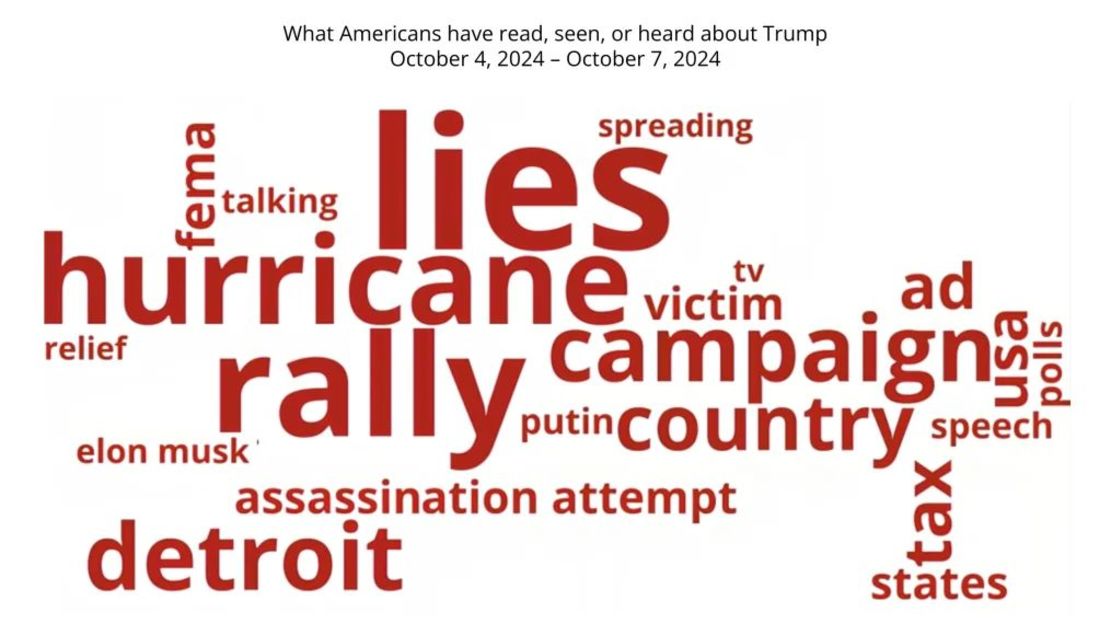() – As the 2024 election campaign enters its final weeks, Kamala Harris is receiving attention for a recent series of high-profile interviews, and Donald Trump for his campaign rallies, according to The Breakthrougha polling project that tracks what average Americans are listening to, reading and watching about the presidential candidates throughout the race. The poll also finds that dishonesty remains a central issue of the election, with “lies” the most common word used in relation to Trump’s campaign.
That division reflects something about each campaign’s strategy with just over two weeks until Election Day. While both Harris and Trump have held rallies and spoken to podcasters, Harris has stepped up her media appearances. Meanwhile, Trump has held or will hold large-scale rallies, including some in solidly Democratic states like California and New York, which, according to some of his advisorsattract the attention of both the media and voters who typically ignore political content.
The survey, conducted by SSRS and Verasight on behalf of a research team from , Georgetown University and the University of Michigan, was conducted October 11-14. During that time, the poll found that both candidates remained clearly in the public eye: 69% of Americans reported hearing, reading or watching something related to Harris in the previous week, while a similar 73% said the same about Trump.
And for both, mentions of the broadly defined topic of “campaign” trumped anything else. Mentions of the campaign made up 36% of responses about Harris and 28% of responses about Trump, an increase of 10 points for each candidate compared to the start of the month.
However, the details for each candidate differed. The word most commonly used to describe the news about Harris was “interview,” with Americans referencing her appearances on CBS’ “60 Minutes” and the “Call Her Daddy” podcast, as well as interviews with Howard Stern and Stephen Colbert. The audiences for these appearances, the survey suggests, often varied widely: the average age of respondents who mentioned “Call Her Daddy” in reference to Harris was 32, for example, while the average age of those who mentioned “ 60 Minutes” was 52 years old.
“(I’ve) heard a lot about Kamala Harris in the last few days,” one respondent wrote. “She is doing the media tour that everyone wanted.”
By contrast, when Americans were asked to describe the news about Trump, “rally” was the second most commonly used word in response. The responses mentioned events Trump held in cities ranging from Aurora, Colorado, to Coachella, California, as well as his plan for an upcoming rally at New York City’s Madison Square Garden.
“I follow him on Instagram,” wrote another respondent. “He’s been posting all his political rallies there.”

Democrats, in particular, were also likely to mention Detroit. During a speech at the Detroit Economic Club, Trump called the city a “development zone,” warning that “our entire country will end up being like Detroit” if Harris wins the presidency.
The survey dates came just after Hurricane Milton made landfall in Florida and, like the survey carried out a week beforefound substantial attention to recent storms, with “hurricane” among the top five words used in relation to both candidates. When Republicans talked about Trump’s response to the hurricane, it was often in conjunction with the words “victim” or “help,” the survey found, while Democrats were more likely to mention it in the context of his spreading misinformation about hurricanes.
The poll results mark the fifth consecutive week during which “lie” was one of the top five words used when discussing Trump, and the first time it topped the list.
“I only listen to him speak at his rallies on television and all he does is LIE!” wrote one respondent.
The word has also been a constant in Harris-related responses, although not as consistently or as prominently. And the survey also finds that the sentiment of responses that use the word “lie” is somewhat less negative when it comes to Harris than Trump, possibly reflecting that some respondents use it in the context of lying about Harris, rather than that she lies to others.
“I hear she’s a liar,” one respondent wrote. “It is not helping with either of the two hurricanes that have occurred in our nation.”
Another wrote: “I read that Kamala Harris is pleading with people to stop lying about hurricane relief and hurricane control.”
The sentiment behind the words Americans used to describe what they had heard about Harris remained modestly more positive than the words they used to describe the news about Trump, but by a much smaller margin than the gaps seen after the National Convention Democrat and the ABC presidential debate. The sentiment is not about those about the candidates personally, but about how positively or negatively the terms and tones used to describe them tend to be framed.
‘s Jennifer Agiesta and Edward Wu contributed to this report.
















Add Comment